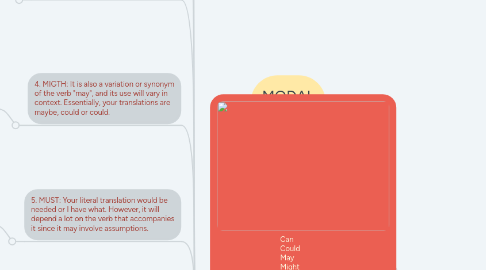MODAL VERBS
by Paola Flores


1. 7. SHOULD: The most common translation for this modal verb is should or should.
1.1. EXAMPLE: You should listen to me.
2. Can Could May Might Must Shall Should Ought to Will Would
2.1. 1. CAN: Its meaning will depend on what you want to say. You can use it to express some possibility or request, or to say that you are qualified or qualified for something.
2.1.1. EXAMPLE: Forgive me, can you tell me what time is?
2.2. 2. COULD: This verb (past "can") can be translated as you could or could. Equally, it establishes possibility as we could.
2.2.1. EXAMPLE: We could meet up today.
2.3. 3. MAY: Your translations are can, maybe, can or can.
2.3.1. EXAMPLE: May I speak now?
2.4. 4. MIGTH: It is also a variation or synonym of the verb "may", and its use will vary in context. Essentially, your translations are maybe, could or could.
2.4.1. EXAMPLE: He might come tonight.
2.5. 5. MUST: Your literal translation would be needed or I have what. However, it will depend a lot on the verb that accompanies it since it may involve assumptions.
2.5.1. EXAMPLE: You must be joking.
2.6. 6. SHALL: It is not a modal verb very common for its formalism. Its translation is identical to that of the verb Will.
2.6.1. EXAMPLE: We shall dance together soon, my lady.
2.7. 8. OUGHT TO: This is a synonym of the modal verb Should, and its translation is the same.
2.7.1. EXAMPLE: I ought to practice more piano.
2.8. 9. WILL: It is used to express something we should do, wait, etc. in a future time.
2.8.1. EXAMPLE: You will find it.
2.9. 10. WOULD: It is translated in multiple ways to arrange or comment on a recurring behavior in the past, and ask someone to perform an action.
2.9.1. EXAMPLE: Would you please close our windows?

